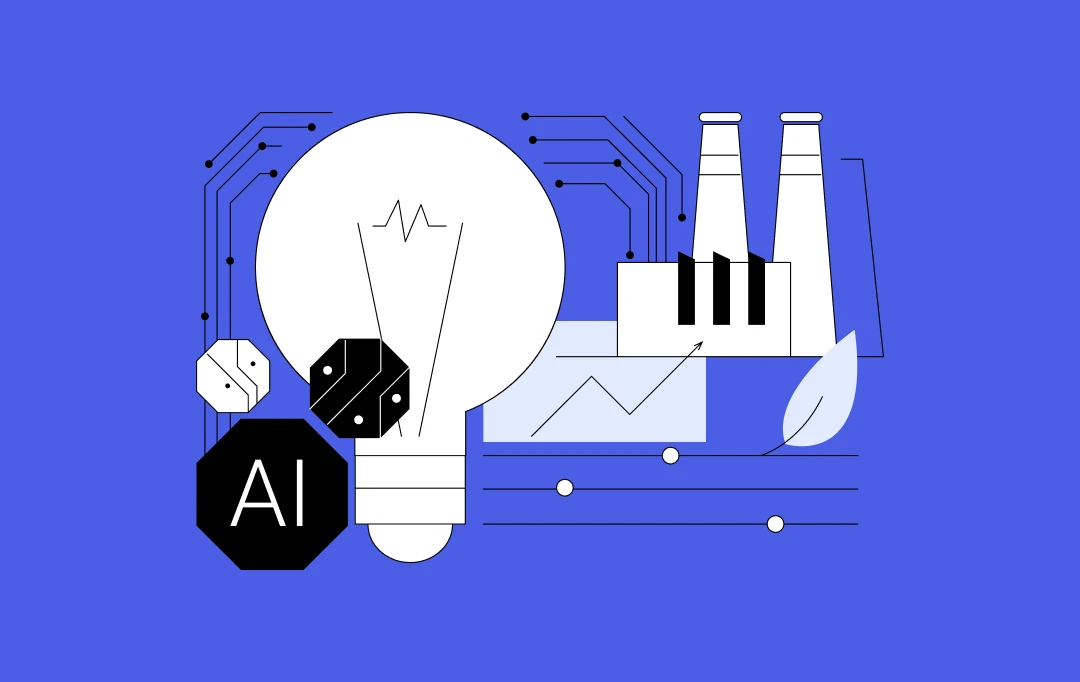- Functions of AI in Energy Sector
- Role of Generative AI in Energy Sector
- Top 10 Applications of AI in Energy Sector
- Monitoring Nuclear Plants
- Energy Grids
- Forecasting Renewable Energy
- CCUS (Carbon Capture, Utilization, and Storage)
- Energy Trading
- Oil Exploration
- Smart Buildings
- Energy Storage
- Demand Response Management
- Predictive Maintenance
- Decoding Benefits of AI in the Energy Industry
- Higher Efficiency
- Preventing Failures
- Digitizing Data
- Reduction in Cost
- Greater Sustainability
- Challenging Core Complexities of the Energy Industry with AI
- Transition to Renewable Energy Sources
- Carbon Dioxide Emissions
- Highly Centralized Energy Providers
- High-Cost Energy
- Sustaining Smart Grid Operations
- What Lies Ahead?
- In the End
- FAQs
Artificial intelligence (AI) is the talk of the world right now and it is rapidly entering the energy sector with tremendous potential to revolutionize the industry. AI in energy can change the way the industry works by making sure that we have a sustainable and secure future.
AI and energy are the “new power couple” as dubbed by the International Energy Agency. Both of these work together to deal with the challenges of the energy industry as analysts predict that we will need AI to manage the electricity grids of the future world.
In this blog, we will cover the function of AI in the energy sector, the challenges faced by the energy industry, the associated benefits, some popular use cases of AI in the energy industry, and the road ahead in the future. But first, let’s decode the presence of artificial intelligence in the energy sector!
Functions of AI in Energy Sector
The modern energy system has several roles for artificial intelligence. AI helps with forecasting and supply management and it can also help in fostering sustainability, optimizing operations, and enhancing efficiency. As the demand for energy increases globally, it is important to integrate artificial intelligence to drive innovation.
If we talk about the energy industry, artificial intelligence comes in the form of data-driven models and complex algorithms for analyzing large data sets that can help in making real-time predictions. AI can learn historical data and anticipate future trends that can help in facilitating a sustainable energy ecosystem.
Statista predicts that the global market of artificial intelligence in the energy market could reach $7.78 billion by the end of 2024. This figure testifies how more and more energy companies and grid operators are recognizing the potential of AI to accelerate the energy sector.
Role of Generative AI in Energy Sector
Generative AI can revolutionize the energy sector as more companies are taking innovative approaches to tackle the energy crisis in the world.
According to McKinsey, “Within the agricultural, chemical, energy, and materials sectors, many companies are now moving beyond straightforward use cases and taking increasingly innovative approaches to adopting Gen AI,” with a proposed value of $550 billion to be created in the coming years.
Generative AI can be used in the energy sector for multiple purposes, such as developing new energy sources, optimizing energy consumption, and strategizing security measures. We can use Gen AI’s power to mitigate climate change by transitioning to low carbon and its leading to zero carbon emissions.
Leveraging the Gen AI prowess, energy companies can reduce their costs and improve their efficiency by optimizing the supply chain. Gen AI can help detect anomalies and potential failures in sensors and machines used for data analysis. The artificial intelligence supports intelligent recommendations and sends alerts arising due to operational failures.
Top 10 Applications of AI in Energy Sector
To gain an in-depth understanding of AI’s function in energy management, we need to explore some real use cases and examples. So, without further ado, let’s jump into the various applications of artificial intelligence in energy and utilities.
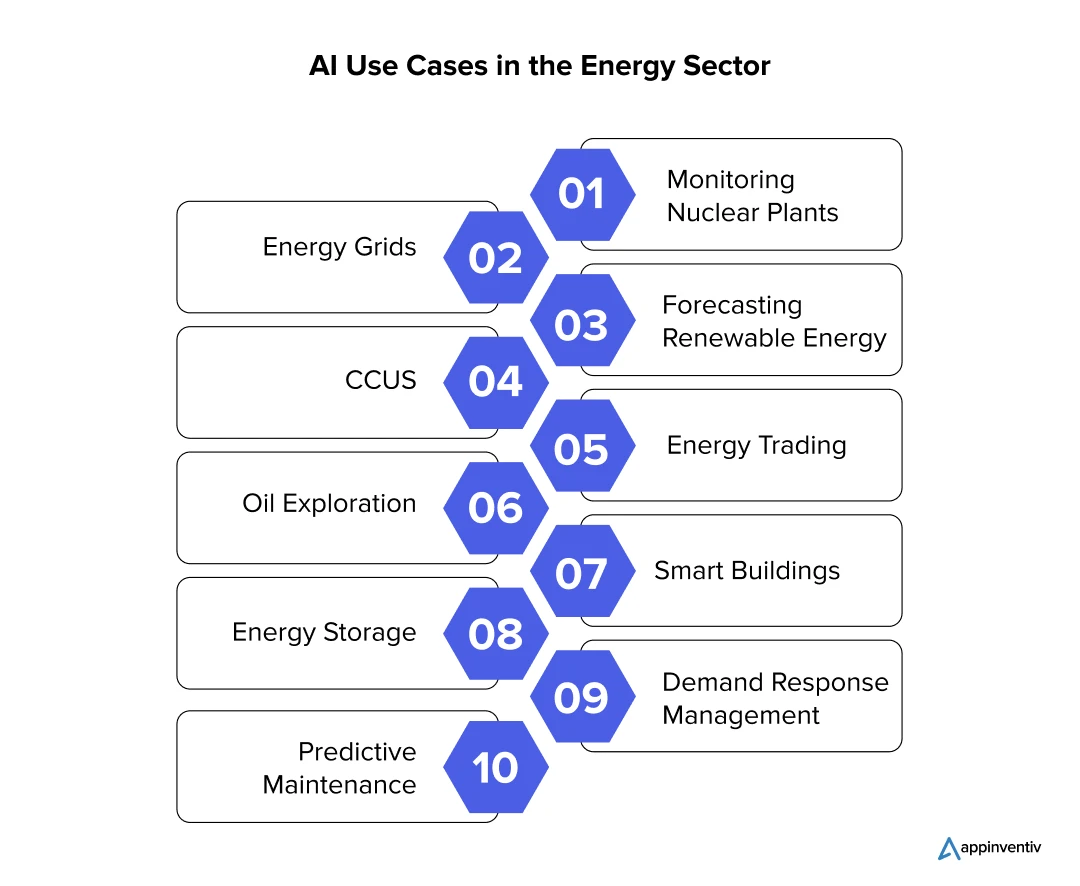
Monitoring Nuclear Plants
Nuclear power plants are the source of a vast percentage of electricity in the whole world. Safe monitoring of nuclear power plants is crucial and artificial intelligence can play an important role in this. You can use AI systems 24/7 to keep a watch over every minute aspect of the plant by using various sensors that can detect the smallest of anomalies.
Artificial intelligence can help in checking if there are any deviations from the safety standards in place. Also, AI can help in identifying potential equipment failure and provide early warning to the plant operators so that they can address the problems before any major incident occurs.
Example
In May 2024, Korea Hydro & Nuclear Power accomplished the successful demonstration of integrating artificial intelligence into the shape management sector of nuclear power plants. What started as a demonstration is now ready to make its way into managing the shape management of its nuclear power plant construction. This will enable the implemented AI technology to keep a detailed insight into development changes over time.
Energy Grids
Managing a smart grid is easily done with the help of artificial intelligence. Smart grids are electric supply channels that take advantage of digital communications to detect local consumption changes. AI algorithms can predict usage patterns with the help of past as well as real-time data.
Generative AI can identify the precise location of the problem and accordingly reroute power to improve grid reliability. Additionally, machine learning (ML) and data analytics can improve the functions of smart grids.
Example
Enel is an Italian energy company whose primary focus is protecting the environment and maintaining sustainability. They use AI to develop smart grids that help in increasing the efficiency of power generation and also help in reducing carbon emissions.
Forecasting Renewable Energy
The generation of renewable energy is crucial in maintaining the ecological balance of the planet. Using AI in renewable energy forecasting is a useful method of balancing supply and demand. Generative AI algorithms can track historical weather data, analyze forecasts, and predict the amount of renewable energy that will be available in the future. The forecast can be used to ensure the supply of reliable energy in any situation.
[Also Read: Renewable Energy Software: Why It Matters for Businesses and How to Build It Right]
Example
VTT EnergyTeller is an energy forecasting service powered by artificial intelligence. It is used by energy companies to overcome problems while shifting towards renewable sources.
CCUS (Carbon Capture, Utilization, and Storage)
Artificial intelligence maximizes the capture of carbon dioxide from emission sources such as power generation plants and the atmosphere. This helps in increasing the efficiency of CCUS systems. AI systems are capable of determining the best ways to use captured carbon, whether for long-term safe storage or industrial activities. To mitigate climate change and reduce greenhouse gas emissions, this technology is essential.
Example
A case study by Geoteric gives a detailed explanation of how they are exploring the possibility of using artificial intelligence for screening potential CCUS locations, with a special focus on the Triassic Bunter Sandstone from the Southern North Sea.
Energy Trading
Artificial Intelligence in energy trading used to analyze intricate market dynamics. Energy firms can make effective trading decisions by using the real-time data processed by AI. AI-powered algorithmic trading is incredibly fast, completing multiple trades in milliseconds. AI in power trading automates processes, models market scenarios, optimizes energy portfolios, and continuously adjusts to shifting market conditions.
[Also Read: How Much Does It Cost to Build an Energy Trading Software]
Managing the ever-changing energy market requires the ability of artificial intelligence to spot patterns and trends in large databases. It can identify market opportunities and threats that human traders might miss, thanks to AI’s remarkable pattern recognition skills.
Example:
To speed up trade and improve value for clients, Statkraft, a producer of renewable energy in Norway, is experimenting with algorithmic trading based on AI and machine learning.
Oil Exploration
Artificial intelligence is used extensively in the oil exploration industry. It can analyze vast amounts of geological data and identify potential oil reserves that might have gone unnoticed by humans. Artificial intelligence can enhance efficiency by predicting the viability of the reserves and can even help in increasing the success rate of these activities.
In addition, AI-powered predictive models are used in drilling operations and anticipating potential challenges. It optimizes the drilling process which results in a safer operation and reduced emissions in the oil industry.
Example
British Petroleum uses AI to analyze geological data and identify potential drilling sites, guaranteeing better resource allocation and higher accuracy. Their AI-based energy solutions help in energy management and optimizing drilling processes.
Smart Buildings
Artificial intelligence has made an impact on homes as well. It can change ordinary buildings into an energy-efficient ecosystem by developing IoT software for energy management and smart meters for monitoring real-time energy consumption. The smart meters enable AI to make data-driven decisions that maximize energy efficiency.
If artificial intelligence were in charge of the heating and cooling systems, it would analyze real-time weather conditions and user preferences to fine-tune the temperature settings. This would help lower operational costs as well.
Example
The AI platform of Verdigrid Technologies evaluates energy data from buildings to suggest improvements and find inefficiencies. Advantages include decreased energy bills, a smaller carbon impact, and increased building sustainability.
Energy Storage
Among the various uses of AI in the energy sector, the capability of AI for storing and distributing renewable energy always catches attention. AI considers factors such as supply and demand, cost, and grid conditions, to determine the perfect time to release and store energy and also the quantity to distribute. Renewable energy sources like solar energy and wind can be stored during peak times and used when required.
As such renewable energy sources become less dependent on the prevailing weather conditions. Storing energy is also important for critical areas such as emergency services and hospitals.
Example
Envision Energy, a Denmark-based company has developed energy storage systems by using AI and IoT that help them easily integrate into smart grid systems. They use smart wind turbines to store energy using prediction capabilities.
Demand Response Management
In the energy sector, demand response management (DRM) is a key tactic for maximizing electricity usage and guaranteeing the stability of the electrical grid. It involves modifying how much electricity consumers use in response to signals from energy suppliers or grid operators.
By enabling real-time responses to changes in energy demand, artificial intelligence can help create an interactive link between consumers and energy providers. AI can improve energy efficiency, lower costs, and facilitate the transition to renewable energy sources by anticipating and controlling fluctuations in demand.
Example
EcoStruxure Grid platform from Schneider Electric harnesses AI’s prowess to optimize demand response across smart grids. The company utilizes edge computing and AI analytics, to handle energy distribution and demand response events in real time, improving grid resilience and efficiency.
Predictive Maintenance
The function of ML in the energy sector can be understood from the use of AI in predictive maintenance. Companies providing energy can forecast when their products need to be serviced as ML analyzes large data sets from historical maintenance records and usage data. It can be used for predicting breakdowns before their occurrence. This method of using AI for utilities helps in decreasing repair costs and minimizing downtime, thus gaining more customers.
Example
Siemens ensures optimal performance and minimizes downtime by using AI to predict and prevent wind turbine failures. It is beneficial since it leads to increased energy output, lower maintenance expenses, and longer asset life.
Decoding Benefits of AI in the Energy Industry
In an era where energy demands are surging, AI is becoming a game-changer for the industry. By leveraging AI in Energy software development services, companies can optimize energy production, enhance grid stability, improve resource management and do a lot more. Let’s explore how AI’s advanced capabilities benefit the energy sector.
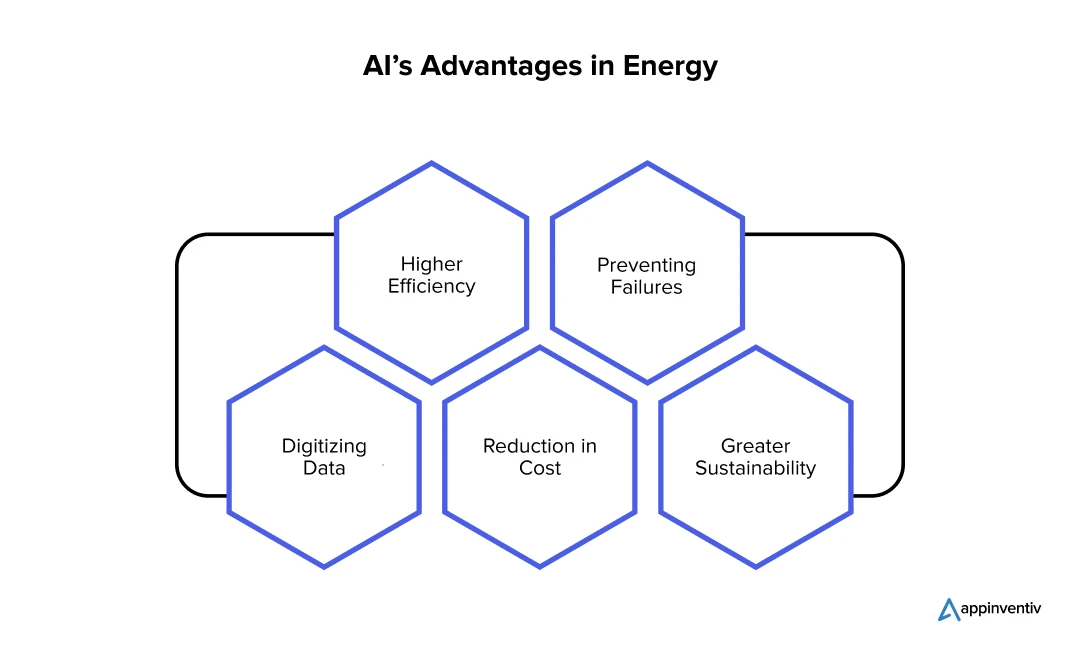
Higher Efficiency
A significant advantage of Gen AI in the energy sector is that it can perform multiple tasks much quicker than a human being. Huge amounts of real-time and historical data are analyzed by the energy industry. Artificial intelligence can help in evaluating data by finding patterns over time. This can help in efficient energy distribution and a raised standard for the efficiency of power plants.
Preventing Failures
Artificial intelligence can help prevent failure in the energy industry. Several oil spill cases have become public in the last few years, highlighting the need for advanced preventive measures. AI can identify potential issues by analyzing data and detecting patterns, enabling proactive measures to prevent problems before they arise. Nowadays, artificial intelligence is also used in the energy sector to prevent grid failures and shortages.
Digitizing Data
Energy firms have a large amount of data to handle and AI enables them to store, process, and manage this data more quickly and affordably. By digitizing and processing data, energy companies can streamline operations and enhance existing practices. Leveraging AI to convert this data into actionable insights allows for improved decision-making and operational efficiency, addressing the sector’s data abundance with advanced, scalable solutions.
Reduction in Cost
AI in the energy sector can reduce the cost of operations and maintenance. Artificial intelligence can monitor various parts of equipment and detect minute deviations that can result in potential failures. Energy companies can take preventive measures during such occasions and this results in lower energy costs for users.
Greater Sustainability
Companies can achieve improved sustainability by using artificial intelligence, thereby decreasing the carbon footprint. Artificial intelligence can analyze weather conditions and power plants to accurately monitor carbon emissions. Moreover, it can also be utilized to switch to solar panels during summer and reduce production during less demanding periods.
Partner with us to realize the the transformative benefits and cutting-edge use cases of Al
Now that we know the transformative applications and benefits of artificial intelligence in energy and utilities, let’s examine how the technology can reshape the renewable energy industry while addressing its challenges.
Challenging Core Complexities of the Energy Industry with AI
The energy industry is facing many challenges that artificial intelligence can capably overcome. With the effective implementation of artificial intelligence in energy and utilities, there are unprecedented opportunities to streamline operations and improve efficiency. Let’s take a look at some of these challenges and how AI can help.
Transition to Renewable Energy Sources
The global energy industry is looking to transition to renewable sources. Fossil fuels are declining rapidly and the need of the hour is to find ways to develop geothermal energy sources. As technology develops, more solar and wind machines will come to the forefront of the energy sector.
Artificial intelligence can help in developing new strategies for energy companies to effectively function with renewable energy sources.
Carbon Dioxide Emissions
With the energy demand rising steadily in the past few decades, global carbon dioxide emission has also increased to dangerous standards. A Statista report says that in the last 30 years, global CO2 emissions have increased by more than 60% and there is a need to reduce carbon dioxide emissions.
Artificial intelligence can help in monitoring fossil fuels by developing advanced production methods, mitigation strategies, and compliance standards so that we get a cleaner atmosphere in the future.
Highly Centralized Energy Providers
The energy industry relies on highly centralized providers for their source of energy. This poses difficulty as a centralization scale can hinder the progress of sustainable development. Using interconnected networks that are smaller in size can be an option for decreasing the reliance on centralized providers. Artificial intelligence can be used to power these smaller networks which can help balance the energy supply and also ensure that the grids are working in the long run.
High-Cost Energy
Using fossil fuels for energy is quite expensive and not sustainable for the future. Also, the operational costs for the energy industry can cause serious stress to the industry leaders. Artificial intelligence can help reduce operational costs and produce new methods of providing reliable energy to the ever-growing global population.
Sustaining Smart Grid Operations
Managing dynamic energy grids is a complex task. Optimizing smart grids has to be done in real time to minimize transmission losses. It’s a challenging task due to the grid’s complexity. Generative AI can provide solutions by using advanced algorithms. Artificial intelligence can analyze large volumes of data and help in load management, grid optimization, and reduced inefficiency. This will lead to the stability of the smart grid.
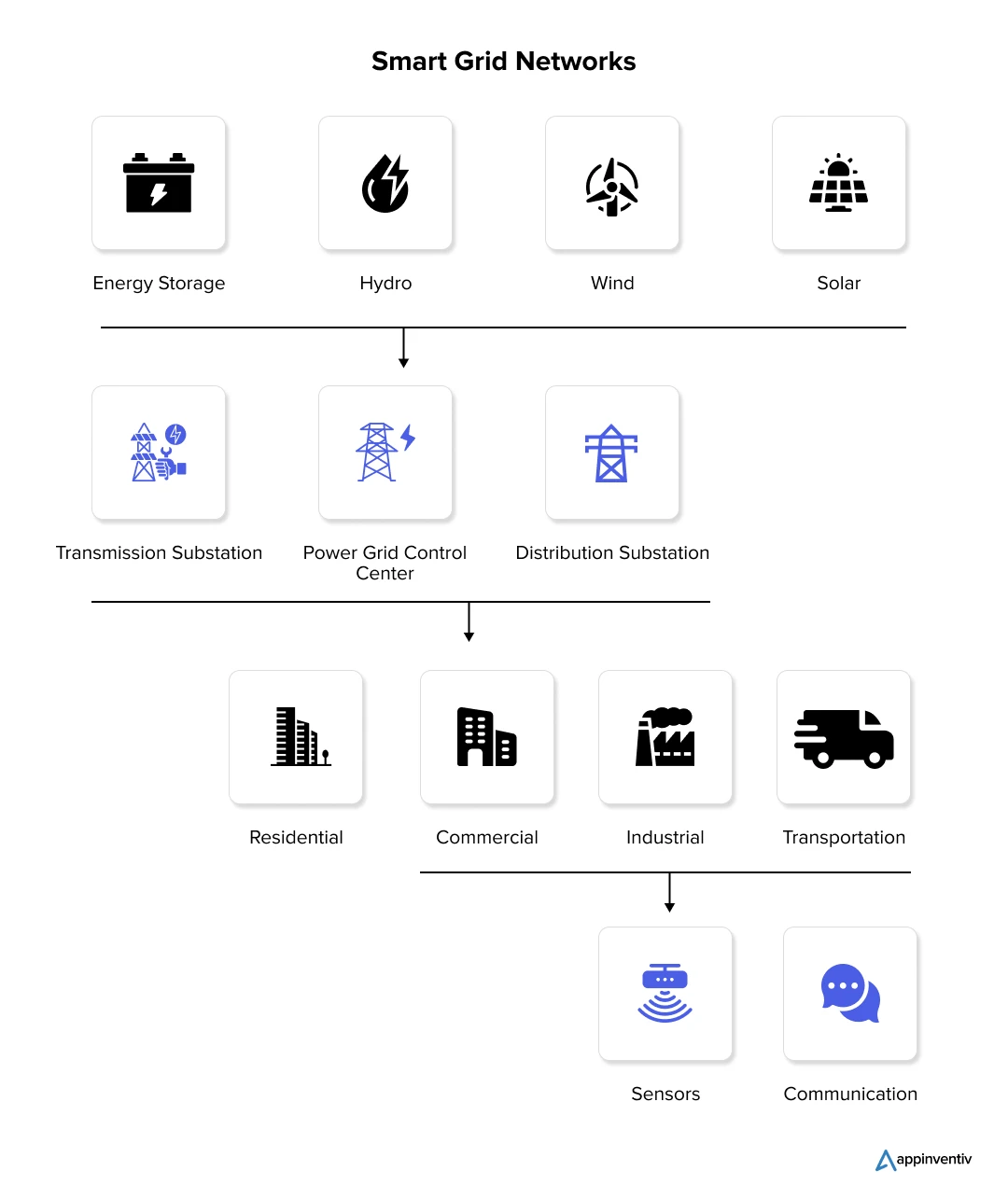
What Lies Ahead?
AI in the energy sector will play a very important role in the future. AI and energy consumption will lead to improved smart grids along with efficient ways of obtaining renewable energy. New technology will come for a reduction in greenhouse gas emissions, and demand response management will become even more prevalent.
As the field of AI continues to evolve, it is anticipated that in the near future, AI will help in storing energy for longer periods and also come to our aid in the fight against environmental changes. With technology, artificial intelligence will be integrated in multiple ways that cannot be imagined right now. This can lead to a sustainable energy landscape in the future.
In the End
The energy sector is an important part of our world, and there is a continuous search for innovative technology to save energy. AI in energy can revolutionize the sector in unprecedented ways. To leverage the maximum potential of artificial intelligence in energy, it is important to collaborate with a reputed AI development company that has proven expertise to help organizations implement AI in energy management systems.
This is where Appinventiv comes into play. Being a leading AI app development company in Dubai, UK, US, Australia and other parts of the world, we have worked with many global businesses that focus on energy management and carbon neutrality.
Reach out to us for more information, and we would be delighted to partner with you for your software needs!
FAQs
Q. How is artificial intelligence used in energy?
A. There are numerous uses of AI in the renewable energy sector. Early detection of faults, storing renewable energy, and monitoring nuclear power plants are some of the most common uses of AI in the energy sector.
To gain an in-depth understanding of AI use cases in energy, please refer to the above blog.
Q. How is AI used in the energy transition?
A. AI is one of the best ways to forecast renewable energy sources. The AI algorithm tracks past climate data and analyzes the future weather to find out where and how much energy we can obtain in the future.
Q. What is the role of AI in energy efficiency?
A. Artificial intelligence can balance multiple complex tasks simultaneously. It can track large volumes of energy data and find patterns for an efficient energy distribution. In addition, it can also help in strategizing a streamlined energy management system.
Q. What are the key challenges of AI in energy sector?
A. Some of the main challenges of AI in energy sector are:
- Lack of AI-trained professionals
- Ensuring the security of energy data
- AI integration into existing energy systems
To address these challenges, businesses need to focus on providing targeted training programs, implementing robust cybersecurity measures, and making strategic plans for seamless AI integration.



How Much Does It Cost to Build an App like Janitor AI?
Key takeaways: Cost Breakdown: The cost of app development varies, with an MVP App costing $40,000 to $90,000, a Mid-Tier App costing $100,000 to $200,000, and an Enterprise Grade App costing $300,000 to $ 500,000 or more, depending on features, complexity, and the expertise of the development team. Key Factors: Platform choice, AI integration, and…

10 Ways AI is Transforming the Healthcare Sector in Australia
Key takeaways: Generative AI could add $13 billion annually to Australia’s healthcare sector by 2030. AI is already transforming operations across diagnostics, admin tasks, and patient care. Healthcare in remote areas is improving with AI-powered virtual assistants and monitoring tools. AI can help address workforce shortages by automating routine tasks and supporting clinical decisions. Major…
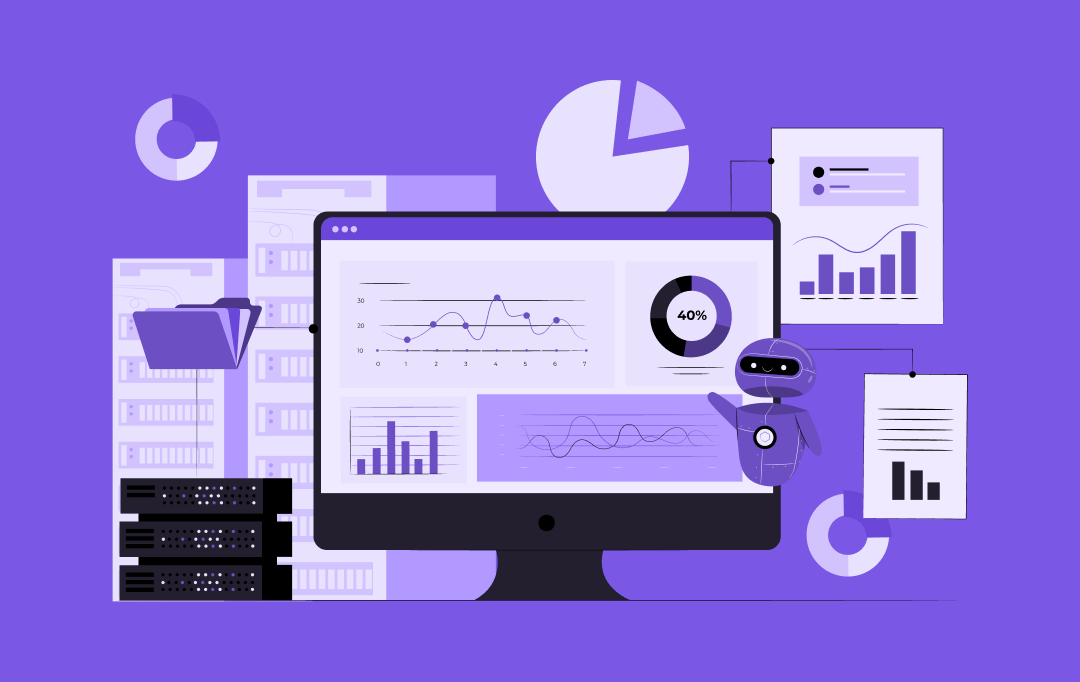
Exploring the Power of AI in Creating Dynamic & Interactive Data Visualizations
Key takeaways: AI transforms data visualization by providing automated insights, interactive dashboards, and NLP, thereby tackling revenue loss and improving data quality. Key features include predictive analytics, real-time data integration, and user-friendly visualizations, enabling faster and more informed decisions. Top 2025 tools, such as Tableau, Power BI, and Julius AI, offer NLP and real-time analytics…






